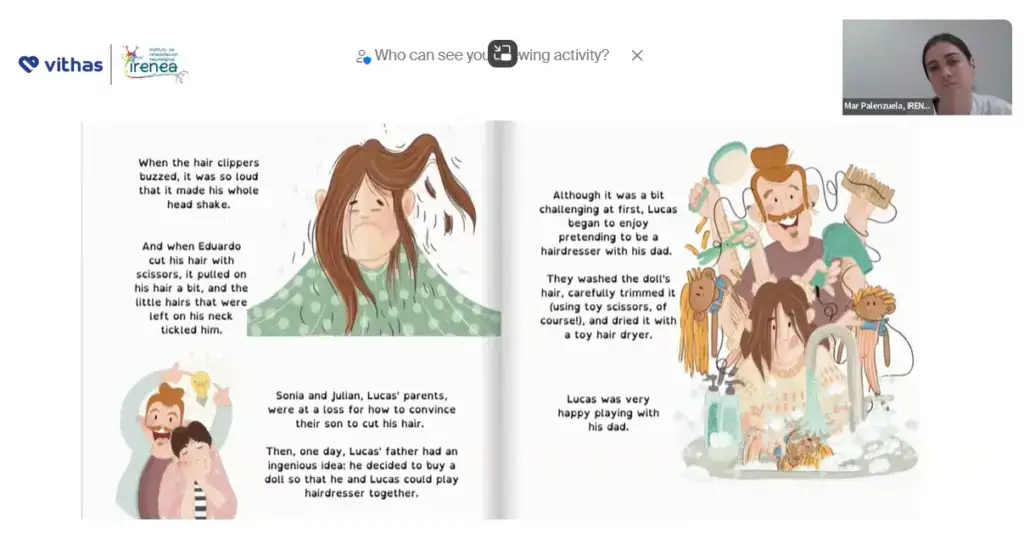EASPD Knowledge Café – The Power of Storytelling in Early Childhood Intervention
On 30th October 2024, the partners of the EarlyBrain Project convened online for the EASPD Knowledge Café, led by EASPD’s Knowledge and Innovation Team to facilitate knowledge sharing among EASPD members and partners. This session explored the significant role of storytelling within Early Childhood Intervention (ECI). Through storytelling, parents and caregivers can foster children’s developmental progress in language, social skills, emotional regulation, and cognitive growth.
The event started with a presentation by EASPD Policy Officer in charge of ECI, Irene Bertana, who highlighted that 95% of a child’s brain forms before the age of 5, and how this age represents thus a unique window of opportunity to foster healthy development. She underscored the profound importance of nurturing early relationships and interactions with primary caregivers, emphasising that a supportive and well-equipped environment for children can influence their lifelong development. She then moved to the EarlyBain project. She presented its aim of equipping parents and caregivers with practical skills to identify and address developmental needs, manage difficult behaviours, and foster positive interaction, thereby instilling self-efficacy and well-being in children from an early age. She also delved into the key project results, which include a toolkit, with stories and training materials that address different situations that represent challenges for these children.
Following the EASPD presentation, Silvia Bertolini, psychotherapist from the Istituto di Gestalt, based in Siracusa, Italy, presented the role of storytelling in Gestalt therapy, particularly within the context of ECI. She highlighted how storytelling functions as a pivotal tool for enhancing emotional connections and creating a safe, expressive space for children and families. In her address, she explained how storytelling supports children in developing language skills, social empathy, and emotional regulation, while enabling families to approach sensitive topics in accessible and meaningful ways. The Istituto di Gestalt’s contributions to the EarlyBrain Project thus embody a holistic approach to child development that is aligned with the project’s objectives.
The session then progressed with insights from Mar Palenzuela, physiotherapist at the IRENEA Neurological Rehabilitation Institute, based in Valencia. She discussed the integration of storytelling within neurorehabilitation settings and described how storytelling serves as an instrumental framework for interventions, enhancing children’s cognitive engagement and social development. Furthermore, she introduced the project’s audiobook, “Lucas doesn’t cut his hair”. The tale is about a young boy who has long hair because he was scared to go to the hairdresser. His fear could be linked to a neurodevelopmental issue that presents characteristics such as cognitive inflexibility, and the difficulty to move out from his routine, sensory hypersensitivity that would be challenged in the noisy hairdresser studio, difficulty with social skills, and anxiety. His parents find and apply different strategies, including role play, anticipating the event with the use of a calendar, changing path to make him gradually familiarise with the place and the people, until they reach the goal and Lucas get his hair done. Lucas’ story was well-received by attendees, who noted its capacity to resonate with young audiences and serve as a practical resource for caregivers.
The Knowledge Café concluded with an engaging Q&A session, during which participants expressed their appreciation for the session’s insights and the speakers’ contributions to advancing ECI. Attendees inquired further into the application of storytelling techniques to support parents and caregivers in their roles, as well as the specific expertise that each speaker brings to the project. These discussions highlighted how storytelling can serve to address both the cognitive and social-emotional needs of children with developmental disabilities.
The EarlyBrain Project exemplifies the transformative potential of storytelling in ECI. Through a multifaceted approach that intertwines evidence-based methods with engaging narratives, the project fosters an inclusive, compassionate environment that supports children’s developmental growth and enriches family and community support structures.

